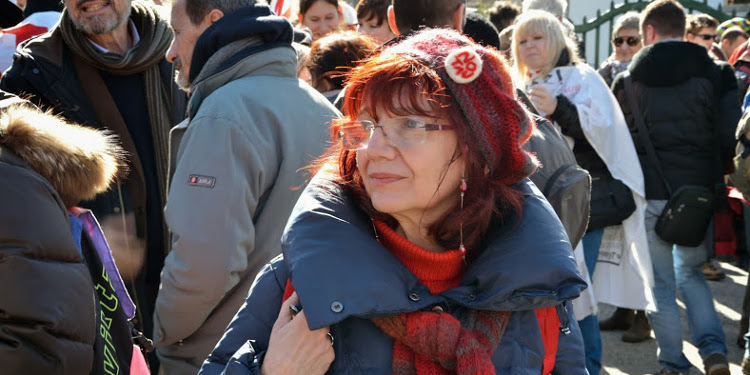| english | italiano |
The arrest of the comrade Nicoletta Dosio is – surely – a hateful act from any point of view you intend to interpret.
The execution of the arrest order, the time frame adopted, Dosio’s age together with the presence of some medical pathologies and the substantial criminal irrelevance of the ascribed “crime” (it is about 700 Euros that Highway Society would have lost because of Nicoletta and the other No Tav activists) would have advised the diligent judges of the Court of Turin to behave less blatantly and redundantly and not, necessarily, oriented towards the compulsory imprisonment of our comrade.
Instead, a few hours before the end of the year, the “brilliant operation” took place which led to the Vallette’s prison the “dangerous subversive”.
This affair – therefore – if, on the one hand, it confirms the persecutory character and open criminal revenge against the protagonists of a social battle that marked the course of the conflict in our country (the No Tav struggle was born at the end of the 1980s and is far from pacified), on the other hand, it is symptomatic of the constitutive and current characteristics of the nature of the State in advanced capitalist societies.
Around the Dosio case – beyond the procedural skirmishes about the possibility of recourse to the so-called alternative measures of detention – the Magistracy (i.e. one of the fundamental pillars of the form/state of capital) has made the principle of the sacredness of the “monopoly of the use of force” and the “dictatorship of the bourgeoisie and its codes” prevail over any expression contradictory to its rule.
This aspect, which the State asserts every time that on the judicial or “governance” field of certain “crisis contexts” there is a fear – even only prospectively – of the possibility of radical criticism of the institutions of the existing order is a concept that must be kept in mind and from which to draw the necessary theoretical and political lessons.
It is enough to go back over the history of our country and it is possible to enucleate this black thread that inexorably marks the class nature and the anti-proletarian nature of the variegated forms of state command.
Of course, it was good for our comrade Nicoletta Dosio – since the last few months – to escape from the cloying “game” on the “alternatives to prison” and it was good for her to claim the social reasons of the No Tav struggle and of the complex of mobilizations against the enormous devastation that this notorious work would cause in the ecosystem of the Val di Susa.
In this context, the human and political solidarity of the Rete dei Comunisti in Nicoletta and the other arrested activists is an indispensable fact that will have to be further amplified and connected with the first mobilizations (starting with those that Potere a Popolo has put in place in dozens of Italian cities on 31/12) that are beginning to take shape and that will have to continue until Nicoletta’s liberation.
But this repressive act is only the “more spectacular” one of an accentuation of the securitarian and repressive policies that are thickening in jobs, territories and society as a whole.
In recent months (at the time of the Conte 1 government) we pointed out that the measures contained in the various “security packages” were not only an expression of the particular anti-migrant hatred of the “fascist Salvini” but represented an attack on the whole range of forms of social and trade union conflict. This “reading” was not maliciously shared by those on our “left” who were oriented to hinder (not even too much!) only the parts of these laws concerning the criminalization of immigrants!
In fact, these measures that the Conte 2 government avoids, in the normative substance, to question have been the progressive and always more wise synthesis of the various decrees and measures that over the years (with or without the presence of the “fascist Salvini”) have been elaborated and launched to build that cage of criminalization of the conflict and of worsening of the penalties which, in fact, determine in our country that “authoritarian democracy” of which the first antisocial effects are beginning to be felt.
Certainly not that until now Italy (it is enough to know a little bit about the history of the Belpaese) was shining to guarantee or legal civilization. Far be it from us to credit the image of a country that has never existed except in the dreams of the exegetes of the “democratic state of the whole people” who have always been denied by the material course of events and by the unspeakable misdeeds committed – yesterday as today – in the name of “democracy”.
How to evaluate, otherwise, the heavy economic sanctions against the workers of Prato in struggle for the defence of the work place or the constant recourse to articles of the Criminal Code which provide for very heavy penalties even in the absence of events which, even remotely, could configure the use of similar codicils (such as the trial underway in Naples against 9 young comrades accused of “devastation and pillage” for a procession protesting against a Salvini kermesse in the Neapolitan city).
Or, again, the suffocating climate of intimidation and persecution that we register at the gates of a factory for leafleting or the thousands of obstacles that are found to organize a procession or a simple garrison.
We must take note that these daily phenomena of “ordinary repression” (to remain in the political chronicle of the squares and leaving aside, just for convenience of exposure, the unstoppable armor that takes place on the ground of the functioning of the institutions of representation, union relations and, more generally, the exercise of “real democracy”) are a boulder, sometimes insurmountable, which, together with other social and political factors, which relate to the general “relations of force between the classes” prevent a possible resumption, on a larger scale, of the conflict and organized struggle in our country.
The “Nicoletta Dosio case” is all internal to this gigantic anti-proletarian device on which it is time to seriously question ourselves – with a less impressionistic modality which, often, characterizes the practice of social organizations and movements of struggle – to build those necessary political and, above all, organizational conditions able to begin to put a decisive Stop to the Repression.
The full freedom of struggle and organization, the systematic opposition to any attempt to limit the same freedoms still formally sanctioned in the Constitution and an indispensable battle, also on the cultural side, to break the paralyzing authoritarian cage which inhibits and affects the development of the conflict can find – in our opinion – a unitary terrain of protagonism and mobilization in the claim of the total cancellation of the “Laws/Decrees of Security”.
An objective which, as we have found in these months, immediately enters into a collision course, not only with the government, but with the complex of strong powers – even those more directly ascribable to the European Union – which are disposed to make waste paper of law, regulations and “constitutional principles” in order to prevent the general resumption of the class struggle.

